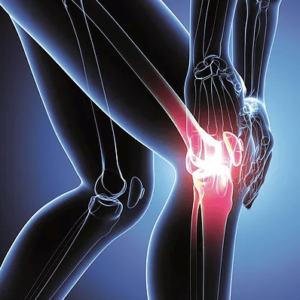At CardioVascular Health Clinic, your overall health matters to us.
When you’re dealing with a debilitating condition such as osteoarthritis, our expert team of interventional radiologists can help.
Chronic knee osteoarthritis (OA) is one of the most common diseases of advanced age. With up to 20 million adults in the US suffering from OA of the knee, close to 700,000 cases progress to total knee joint replacement if left untreated.
However, there exists a large demographic of chronic joint pain patients who are not candidates for invasive procedures due to BMI, age, and other outside factors.
While many opt for alternative therapies such as arthroscopic debridement or injections, they are often associated with less-than-optimal clinical outcomes. Therefore, instead of these therapies, or even in conjunction with them, we recommend a noninvasive geniculate nerve ablation.

If you or a loved one has been diagnosed with knee osteoarthritis or are at risk of developing the condition, it is important to get evaluated and understand the best treatment options available for your unique situation and health goals.
Let’s discuss knee osteoarthritis in more detail, including what it is, common symptoms, and innovative knee osteoarthritis treatment options offered here.
Knee osteoarthritis is the most common form of arthritis, a condition affecting the knee joints.
When knee osteoarthritis occurs, the cartilage protecting the ends of your knee bones wears away. This typically happens over several years, and symptoms progress if left untreated.
While knee osteoarthritis is the most common type, you can also experience osteoarthritis in the hips, hands, or spine.
Once you develop severe knee osteoarthritis, you can suffer tremendous pain and loss of function, ultimately limiting your mobility and negatively impacting your overall health and physical activity level.
Knee osteoarthritis causes a wide range of symptoms that worsen over time.
Common symptoms include
It is essential to understand that anyone can develop knee osteoarthritis.
Certain factors may increase your risk, including
Home remedies and medication regimes are not always effective for patients with chronic knee osteoarthritis or degenerative joint disease of the knee.
In many cases, surgery may be the most effective. However, in cases where the patient is not a good surgical candidate (for example, due to age or the existence of two or more chronic conditions), there is another option to treat knee pain.
The genicular nerve block and radiofrequency ablation (neurotomy) provide very effective therapeutic alternatives to surgery. The geniculate nerves are the nerves that sense pain in the knee.
The genicular nerve block and genicular radiofrequency ablation (RFA) can be done before or after knee surgery and may help patients avoid invasive surgery altogether.
The nerve block injects local anesthetic on the genicular nerve itself. This procedure tests the patient's response to determine if sufficient pain relief is experienced.
When the nerve block successfully provides substantial relief, this justifies a genicular nerve ablation or radiofrequency ablation, a longer-lasting pain relief option.
The ablation procedure works on the theory that cutting the nerve supply to the knee may alleviate pain and restore function.
You shouldn’t have to live with unrelenting knee pain due to knee osteoarthritis.
At CardioVascular Health Clinic, we understand the impact a total knee replacement can have on your life. That’s why we pride ourselves on offering minimally invasive alternatives to major surgery.
Our team is qualified to both diagnose and treat knee osteoarthritis and is here to provide you with relief every step of the way.
If you or a loved one are experiencing symptoms consistent with knee osteoarthritis, we can help.
Call us at 405-701-9880 or book a consultation online today.